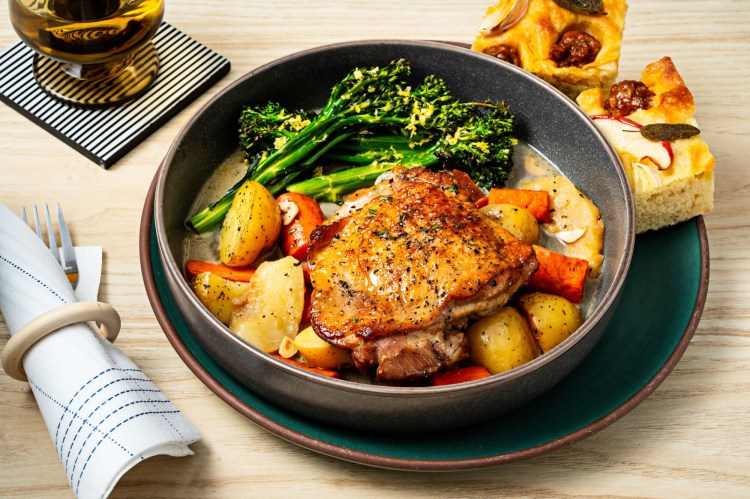This year, our Thanksgiving meals are going to be pricier.
Inflation has us paying more than ever before at the grocery store, and a new wave of avian flu could further push up the price of the holiday meal’s traditional centerpiece.
But even as our grocery lists expand, there are ways to save without feeling too much of a pinch. We enlisted the help of experts on thrifty food shopping and cooking to share their ideas for keeping more of your money in your wallet this holiday season – and beyond.
1. Rethink Thanksgiving traditions
The pandemic threw a wrench in many a holiday plan over the past two years. And while many of these disruptions have been painful, they just might offer the chance to re-examine the things we’ve done out of habit and decide if we want to keep them around or toss them. As we’ve learned, the holidays aren’t about following a script.
“There’s this idea that the holidays demand certain things – but the holidays aren’t a person,” says Leanne Brown, author of “Good and Cheap: Eat Well on $4 a Day” and “Good Enough: A Cookbook.” While she notes that some holiday traditions might be worth the time and money, it’s a good idea to at least consider the possibility that they’re optional. “It’s more important to examine what are you hoping for with the holidays, and maybe it doesn’t necessarily mean having to make pumpkin pie or have a turkey if that’s causing you more stress, or if it’s not in the budget.”
That could mean serving chicken if it’s more affordable, or going a completely nontraditional route. A Thanksgiving ham? A taco buffet? Braised turkey thighs? There’s no law against any of it.
This year, you might even find that buying some or all of the meal ready-made might be less expensive than cooking at home. Restaurant prices are rising, but they aren’t rising at the rate that groceries are, so this might be the year to dine out if that’s appealing (no dishes?) or to get takeout.
2. Downsize the Thanksgiving meal
No matter what you’re serving, experts say avoiding food waste is key, and not a bad thing to consider year round. After all, there are only so many times you can eat leftover-turkey sandwiches before you need to pitch the lingering bird. Consider paring down your menu; do you really need five sides and two kinds of rolls? Is there a dish that only one family member likes? (In my family, Dad was the only one who ate the mincemeat pie, but we had it every year.) If so, maybe drop it.
And think through your bird size. Many people go too big. The Agriculture Department suggests one pound of turkey per person. “American households waste a lot of food, especially around the holidays,” says Jessie Fan, chair of the University of Utah’s Family and Consumer Studies Department. “The portions are so big, and there are lots of dishes.”
Limiting the number of dishes and portions, she says, could be a win-win-win for your budget, the environment and your health.
3. Be flexible
Brown suggests looking to see what is inexpensive at your local market and then figuring out what to make, rather than shopping to a recipe. “Maybe it’s sausage, and you think, ‘What can I do that’s really lovely with sausage?’ ” she says. “Look for what’s on sale and work backward.”
There are plenty of strategies for keeping your grocery tab down, even at the holidays, and Fan notes that money-saving grocery tactics that work all year round – like avoiding more-expensive processed foods and not being overly brand-loyal to get the best deal – are even more important this time of year.
Luke Erickson, a personal finance extension specialist at the University of Idaho’s Margaret Ritchie School of Family and Consumer Sciences, says he always coaches people to save up for the holidays throughout the year. And shopping as far ahead as possible, at least for the shelf-stable items you need, might allow you to nab things on sale. “Plan ahead and shop ahead – that advice is a little more true because of supply and price issues,” he says.
4. Consider a Thanksgiving potluck
If you usually shoulder most of the cooking (and the shopping that it entails), you might want to change things up and ask people to bring some dishes. Your family and friends probably won’t mind. “You can make it a mini-potluck,” Fan suggests. “Those are really efficient.”
And no matter what winds up on the table, it’s still less important than the time spent with the people around it. Erickson notes that well-documented research shows that experiences bring more and longer-lasting satisfaction than any tangible goods.
And you never know – any adjustments you make in the name of what’s available or affordable might wind up as new traditions. Erickson recalls that on one long-ago Thanksgiving, his mother didn’t have the right ingredient for a salad, so she tossed in some canned shrimp – and now that’s become an annual family favorite. “The important thing,” he says, “is to not let scarcity bring your holidays down.”
Send questions/comments to the editors.


